How The Legal Process Unfolds In An Instagram Addiction Lawsuit?
- Last Updated: January 15th, 2026
Key Takeaways
Individuals can start an Instagram addiction lawsuit if they or their children have suffered harm from excessive use, providing evidence that the platform contributed to addictive behaviors and psychological issues.
The legal process for these lawsuits involves filing a complaint in court against Instagram's parent company, collecting user activity logs, expert testimonials on mental health impacts, and evidence of the platform's engagement tactics.
Legal representation specializing in social media harm is essential; find lawyers who offer free evaluations and understand how to navigate statutes of limitations for these cases.
Overview of the Instagram Addiction Lawsuit
On this page, we will provide an overview of the Instagram addiction lawsuit, gathering evidence of your Instagram addiction lawsuit, how to file an Instagram addiction lawsuit, and much more.
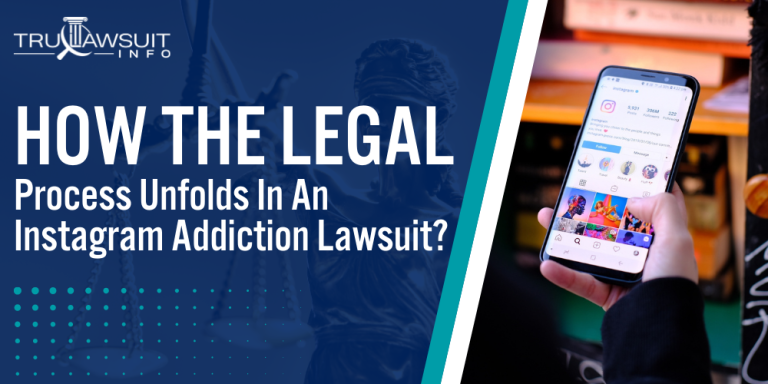
Intro to the Instagram Addiction Lawsuit
Key Elements of the Lawsuit:
- It is claimed that Instagram’s design includes addictive features that preoccupy users, especially youths.
- The lawsuit points to algorithms that allegedly prioritize engagement over user well-being.
- Meta is accused of understating the negative effects of its platforms on young users’ mental health.
- The coalition of attorneys general is seeking accountability and remedial measures from Meta.
- Legal proceedings began after extensive investigation and research into social media’s impact.
- The social media lawsuit is part of a broader trend of addiction lawsuits targeting tech and social media companies.
If you or a loved one have faced mental health challenges due to an Instagram addiction, you may qualify for legal action.
Contact TruLaw using the chat on this page for a free case evaluation to see if you qualify to file today.
Role of Instagram in the Youth Mental Health Crisis
Instagram’s impact on young people’s mental health has been a significant concern, with various factors contributing to the pressures and challenges faced by the youth.
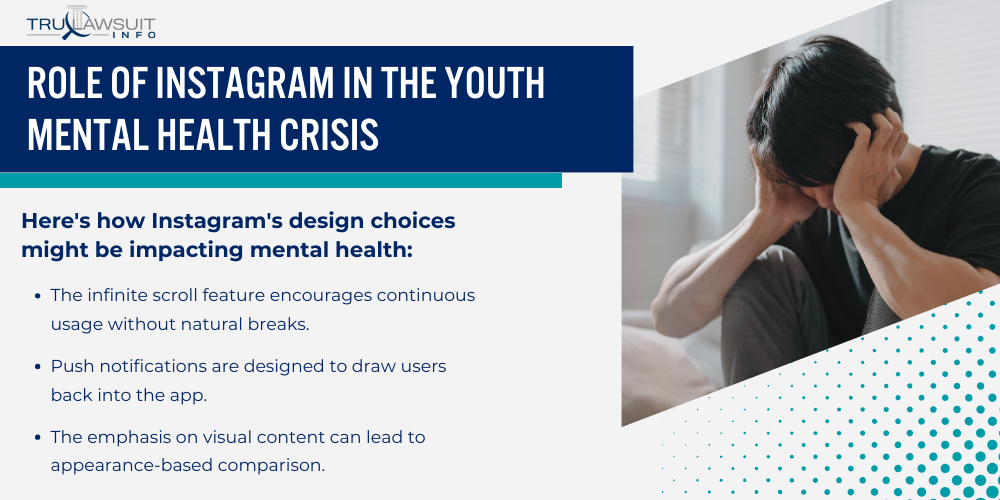
Design and Development Practices
Instagram, owned by Meta, is under scrutiny for its design and development practices.
Research suggests that the platform’s algorithms and features may be contributing to a youth mental health crisis by fostering addiction and lowering self-esteem among younger users.
Here’s how Instagram’s design choices might be impacting mental health:
- The infinite scroll feature encourages continuous usage without natural breaks.
- Push notifications are designed to draw users back into the app.
- The emphasis on visual content can lead to appearance-based comparison.
- Features like likes and comments can create a feedback loop seeking peer validation.
Internal Research and Knowledge
Meta’s internal research has shed light on Instagram’s role in affecting the mental health of young users.
Documents revealed during various investigations indicate that the tech company was aware of the negative impacts its platform could have.
Here’s what the research found:
- Instagram acknowledged that its platform could exacerbate issues like anxiety and depression.
- The company noted a negative impact on body image, particularly among teenage girls.
- Meta conducted studies that highlighted “addiction-like behavior” among youth on Instagram.
- Despite this knowledge, features and algorithms fostering prolonged engagement were retained.
Age-Appropriate Standards and Parental Controls
Meta has been criticized for not adhering to age-appropriate standards and providing adequate parental controls.
Questions arise regarding how well the parent company ensures Instagram is safe for its younger audience.
Here’s how the issue of age-appropriate standards and parental controls plays out on Instagram:
- Instagram requires users to be at least 13 years old, but enforcing parental consent has been lax.
- Features aim to safeguard minors, but the effectiveness of these tools is debated.
- Parental controls do exist, yet they may not be sufficiently robust or visible to parents.
- There’s an ongoing discussion about new standards to protect minors better online.
Legal Framework of the Instagram Mental Health Lawsuit
The legal action against Instagram involves multiple jurisdictions, engaging various legal figures from state attorneys general to federal judges, all amidst claims of detrimental mental health effects on young users.
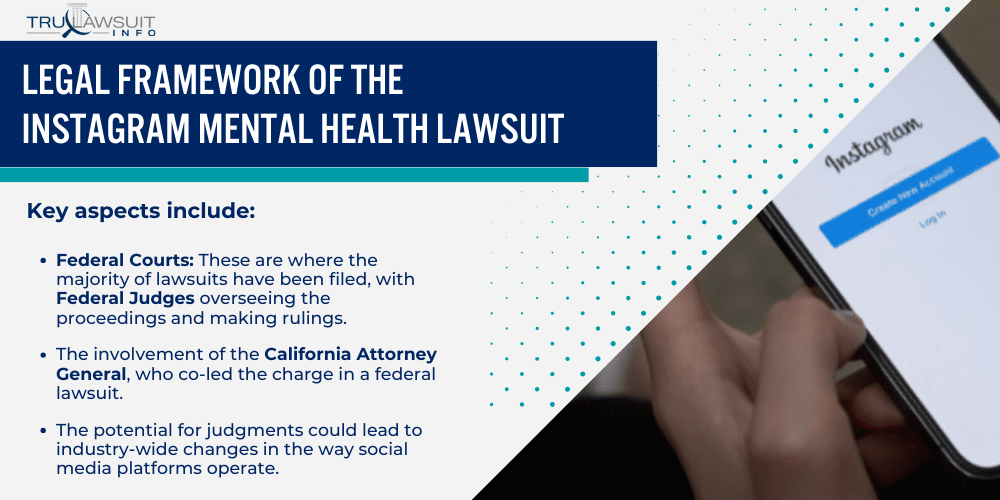
Federal Lawsuits and Judgments
The Federal Suit plays a pivotal role in this litigation, with allegations that Instagram’s algorithms and features have been designed in a way that negatively impacts the mental health of young users.
Key aspects include:
- Federal Courts: These are where the majority of lawsuits have been filed, with Federal Judges overseeing the proceedings and making rulings.
- The involvement of the California Attorney General, who co-led the charge in a federal lawsuit.
- The potential for judgments could lead to industry-wide changes in the way social media platforms operate.
- How outcomes in these cases might influence future Legal Action related to tech companies and youth mental health.
State Court Cases
State Court hearings are instrumental in addressing the impact of social media on a regional level.
Important elements surrounding these cases include:
- The role of Attorneys General from various states in initiating legal challenges.
- How these cases reflect the concerns of individual states regarding youth mental health.
- The repercussions of state court decisions on local policies and potentially as precedents for other jurisdictions.
- Consideration of state-specific legal standards and the welfare of the constituents.
Attorneys General and Legal Authorities
The attorney general spearheading these lawsuits holds significant legal authority in this matter.
They emphasize:
- Their duty is to protect public welfare, which includes safeguarding youth from the harms of social media.
- The bipartisan approach in how they have unified across states in the New Lawsuit.
- The legal strategies employed to argue the case in both federal and state courts.
- The enforcement of consumer protection laws and regulations pertaining to digital safety.
Free Case Review and Consultation
For those affected, the offer of a Free Case Review and Free Consultation presents an avenue to understand personal legal options.
This aspect involves:
- Accessibility to legal expertise to evaluate the strength and relevance of potential social media addiction claim.
- Information on the rights of individuals and families regarding mental health and social media.
- The chance to join a larger legal movement without immediate financial burden.
- Legal firms provide insights into the process of joining the lawsuit or initiating individual actions.
Instagram's Negative Effect on Mental Health in Teenagers
With lawsuits alleging that Instagram has contributed to a mental health crisis among young people.
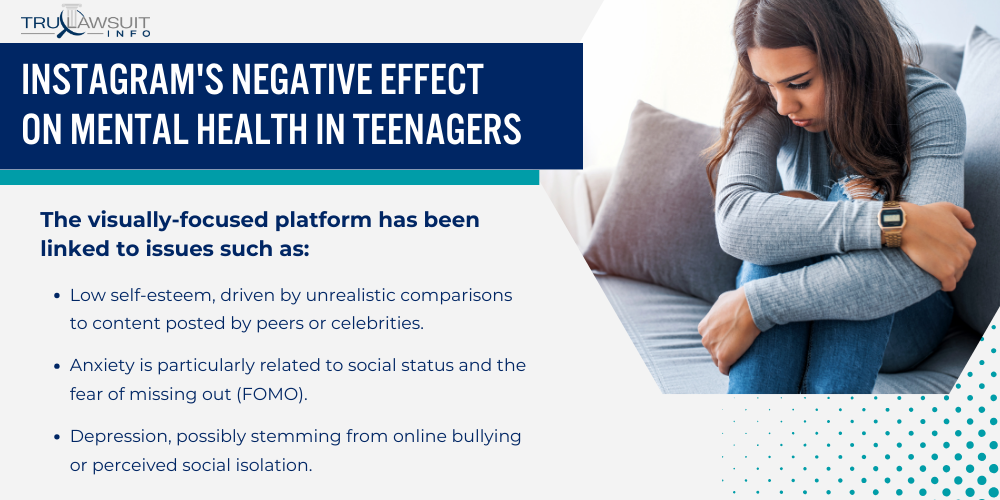
It’s important to examine how Instagram and other social media platforms specifically affect teenagers’ well-being.
Young People and Mental Health Issues
Instagram has been implicated in exacerbating mental health problems among its teenage users.
The visually-focused platform has been linked to issues such as:
- Low self-esteem, driven by unrealistic comparisons to content posted by peers or celebrities.
- Anxiety is particularly related to social status and the fear of missing out (FOMO).
- Depression, possibly stemming from online bullying or perceived social isolation.
- Suicidal ideation, with some research suggesting a correlation between heavy social media use and harmful psychological outcomes.
Key studies, like those led by New York’s Attorney General, Letitia James, have added validation to these concerns.
Consequences of Prolonged Social Media Use
The long-term use of Instagram and similar platforms might lead to persistent mental health issues.
Notable consequences include:
- Psychological harm from cyberbullying can occur more easily behind the anonymous veil of the internet.
- Chronic mental health problems are tied to the need for social validation and the addictive nature of social media scrolling.
- A paradoxical increase in feelings of loneliness and social isolation, despite being more “connected” online.
- Physical health issues like disrupted sleep patterns are interlinked with mental well-being.
In response to these mounting concerns, attorneys general across the United States have taken action, as seen in the lawsuit initiated by a coalition including Colorado.
Public Health Perspective
From a public health standpoint, Instagram’s impact on the mental health of teenagers is a significant issue.
Points of interest include:
- Elevated incidence of mood disorders among teens who frequently engage with social media.
- Links to behavioral addictions are akin to those found with gambling, where the reward system of likes and comments plays a similar role.
- The proactive role of institutions in tackling the problem, is illustrated by legal challenges against platforms like Instagram by public officials for potentially harmful practices.
Research from public health agencies has contributed to understanding these effects, as seen through the documented concerns by the Massachusetts Attorney General, Andrea Joy Campbell.
Claims of Physical and Psychological Harm From Instagram Use
Instagram and similar social media platforms are facing lawsuits alleging that their products have caused physical and psychological harm to users—particularly among younger demographics.
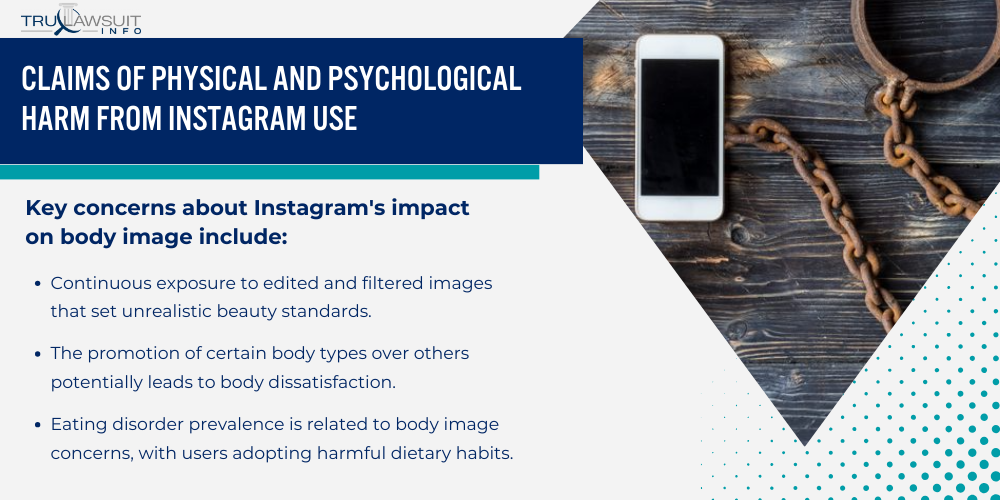
The key allegations include the exacerbation of body image issues, the promotion of eating disorders, and the creation of a connection between the platform’s use and an increase in self-harm and suicidal thoughts.
Body Image and Eating Disorders
The widespread use of Instagram has been linked to the development of negative body image in some users.
This connection is particularly strong among teenagers, who often compare themselves to the idealized images they see on the platform.
Key concerns about Instagram’s impact on body image include:
- Continuous exposure to edited and filtered images that set unrealistic beauty standards.
- The promotion of certain body types over others potentially leads to body dissatisfaction.
- Eating disorder prevalence is related to body image concerns, with users adopting harmful dietary habits.
- Direct and indirect encouragement of extreme dieting or fitness routines, often without regard to healthy practices.
Connections to Self-Harm and Suicidal Thoughts
Studies suggest that excessive use of Instagram may correlate with an increased risk of self-harm and experiencing suicidal thoughts.
The content consumed on Instagram can affect users’ mental health, especially when they deal with cyberbullying or encounter distressing material.
Concerns with Instagram’s possible links to self-harm and suicidal thoughts involve:
- Comparison culture leads to feelings of inadequacy and lowered self-esteem.
- Cyberbullying and the ease of spreading harmful comments can be triggers for self-harm.
- Features such as the ‘like’ button create a quantifiable measure of popularity, which can influence users’ sense of self-worth.
- Lack of adequate controls to prevent access to content that might glamorize or trivialize self-harm and suicidal thoughts.
Demographics Affected by Social Media Addiction
The recent lawsuits against major social media companies reveal a growing concern regarding the impact of platforms like Instagram on specific demographics.
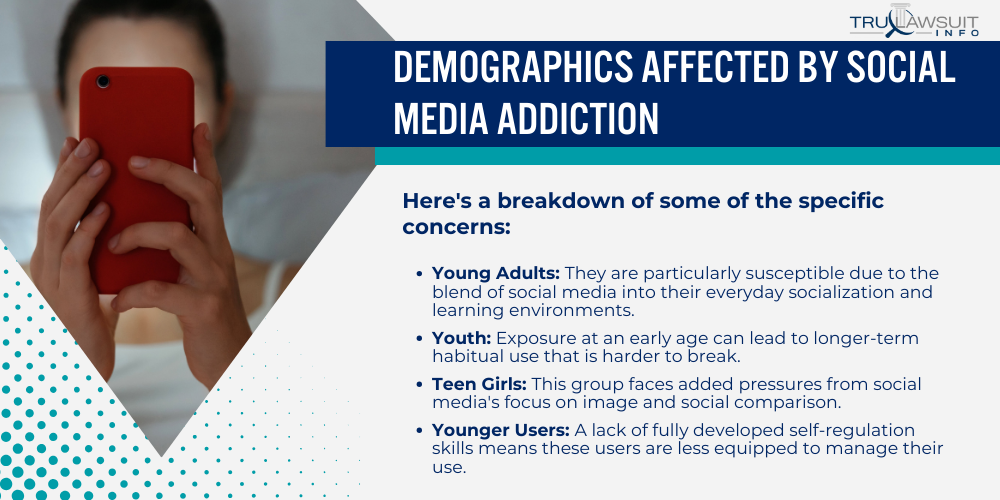
Particularly, the young population is at the forefront of this issue, with arguments suggesting an intentional design to foster addiction.
Young Users and Vulnerable Populations
Young users and vulnerable populations are often the most impacted by the addictive nature of social media platforms.
Here’s a breakdown of some of the specific concerns:
- Young Adults: They are particularly susceptible due to the blend of social media into their everyday socialization and learning environments.
- Youth: Exposure at an early age can lead to longer-term habitual use that is harder to break.
- Teen Girls: This group faces added pressures from social media’s focus on image and social comparison.
- Younger Users: A lack of fully developed self-regulation skills means these users are less equipped to manage their use.
For example, Attorney General Bonta’s lawsuit against Meta highlights the detrimental effects of Instagram and Facebook on young users’ mental health.
Differentiating Impacts on Various Age Groups
The impact of social media addiction also varies across different age groups due to developmental and lifestyle factors.
Here’s a breakdown of how social media can affect different age groups:
- Teenage Girls: The effects can be particularly profound, with studies linking social media use to increased rates of depression and anxiety.
- Young Adults: Are often at a stage of identity formation and may be more vulnerable to the influence of social media on self-perception.
- Youth: They may face disruptions in education and social development due to excessive screen time and engagement.
- Younger Users: Are at risk as their early exposure can set patterns for future digital consumption habits.
The Multi-District Litigation case detailing the claims about social media platforms being designed to maximize screen time serves as an example of the widespread concern for different age groups, especially the youth.
Societal and Educational Impact
Instagram’s influence extends beyond individual use and affects broader societal and educational contexts, necessitating a discussion on the role of educational institutions and parental involvement.
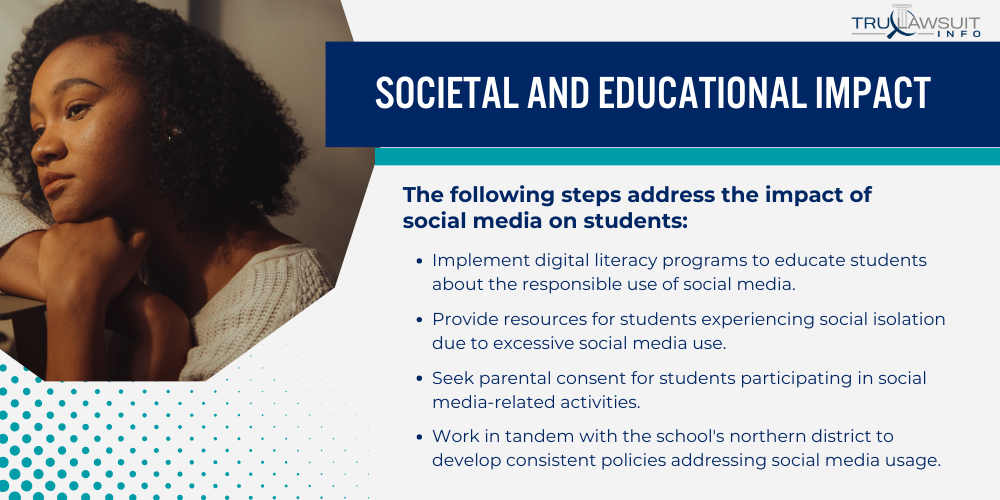
Role of Educational Institutions
Educational institutions play a significant role in mitigating the impact of social media on students.
The following steps address the impact of social media on students:
- Implement digital literacy programs to educate students about the responsible use of social media.
- Provide resources for students experiencing social isolation due to excessive social media use.
- Seek parental consent for students participating in social media-related activities.
- Work in tandem with the school’s northern district to develop consistent policies addressing social media usage.
Parental and Guardian Awareness
Parental awareness and action are pivotal in confronting the challenges posed by social media.
Here’s how parents and guardians can contribute to spreading awareness:
- Monitor their children’s social media activity with transparency and open communication.
- Collaborate with schools to understand the policies and initiatives that require parental consent.
- Combat social isolation by encouraging face-to-face interactions and involvement in community activities.
- Leverage educational resources provided by school districts to support their children’s well-being.
Schools and parents are advised to review relevant information on the educational impact of social media to better prepare for these challenges.
Perspectives and Prevention of Social Media Over Usage
The growing concern over behavioral addiction to social media has led to a critical assessment of user interaction with platforms like Instagram.
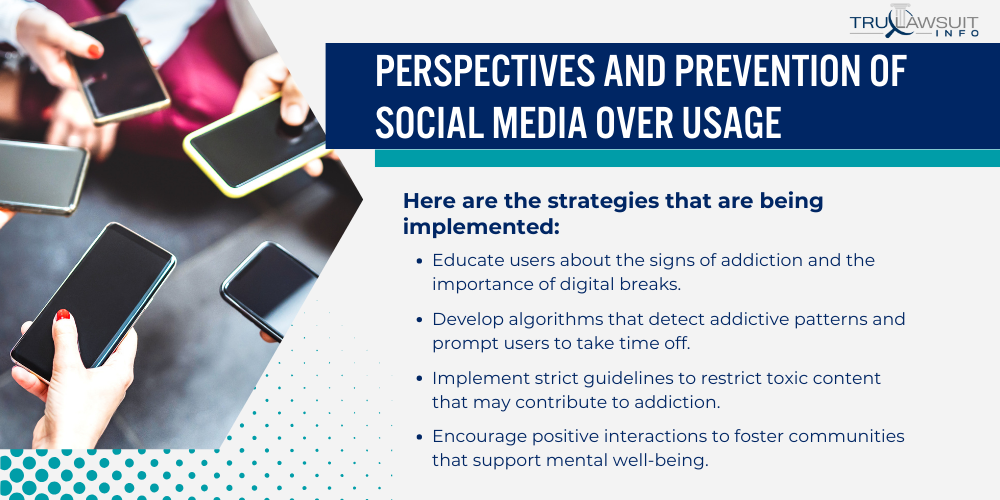
Efforts are focused on enhancing user safety and addressing the spread of harmful content.
Building Safer Online Communities
Creating a safe online space requires the collective action of individuals and social media giants.
Here are the strategies that are being implemented:
- Educate users about the signs of addiction and the importance of digital breaks.
- Develop algorithms that detect addictive patterns and prompt users to take time off.
- Implement strict guidelines to restrict toxic content that may contribute to addiction.
- Encourage positive interactions to foster communities that support mental well-being.
Reform Proposals for Social Media Platforms
Legislation and platform policies need to evolve to mitigate the risks of social media over usage.
Considerations for reform include:
- Enforcing age restrictions more stringent to protect young minds from potential public nuisance issues.
- Mandatory transparency reports detailing efforts to combat addiction and harmful content.
- The creation of features that actively promote breaks and periods of non-usage.
- Sanctions for platforms that fail to safeguard against the proliferation of addictive behaviors and harmful content.
These initiatives represent a significant step toward curbing the challenges associated with social media’s connectivity.
Frequently Asked Questions
-
Individuals may seek compensation for psychological harm, recovery costs, or time lost due to the addictive aspects of social media.
Monetary settlements are typically distributed among class members, although specifics vary per case.
-
Attorneys general from multiple states have filed lawsuits against Meta, accusing the company of designing platforms that foster addiction, particularly among young users.
They allege violations of consumer protection laws and seek both financial and injunctive remedies.
-
One typically needs to demonstrate harm resulting from the platform’s design, such as addiction or mental distress, to participate in the lawsuit.
The specific requirements may vary depending on the lawsuit.
-
Companies face legal challenges for allegedly designing platforms to be psychologically addictive, neglecting users’ well-being, and failing to warn about potential harm.
-
The most direct precedent for social media addiction lawsuits can be drawn from the legal strategies used against the tobacco industry.
In those cases, companies were eventually held accountable for not warning consumers about their products’ addictive nature and health risks.

Attorney Jessie Paluch, founder of TruLawsuit Info, has over 25 years of experience as a personal injury and mass tort attorney, and previously worked as an international tax attorney at Deloitte. Jessie collaborates with attorneys nationwide — enabling her to share reliable, up-to-date legal information with our readers.
Legally Reviewed
This article has been written and reviewed for legal accuracy and clarity by the team of writers and legal experts at TruLawsuit Info and is as accurate as possible. This content should not be taken as legal advice from an attorney. If you would like to learn more about our owner and experienced injury lawyer, Jessie Paluch, you can do so here.
Fact-Checked
TruLawsuit Info does everything possible to make sure the information in this article is up to date and accurate. If you need specific legal advice about your case, contact our team by using the chat on the bottom of this page. This article should not be taken as advice from an attorney.
You can learn more about the Social Media Harm Lawsuit by visiting any of our pages listed below:
Here, at Tru Lawsuit Info, we’re committed to helping victims get the justice they deserve.
To do this, we actively work to connect them with attorneys who are experts in litigating cases similar to theirs.
Table of Contents
Tru Lawsuit Info is a reliable source of information about issues that may affect your health and safety, such as faulty products, data breaches, and environmental hazards.
Our team of experienced writers collaborates with medical professionals, lawyers, and advocates to produce informative articles, guides, and other resources that raise awareness of these topics.
Our thorough research provides consumers with access to reliable information and updates on lawsuits happening around the country. We also can connect consumers with attorneys if they need assistance.
Here, at Tru Lawsuit Info, we’re committed to helping victims get the justice they deserve.
To do this, we actively work to connect them with attorneys who are experts in litigating cases similar to theirs.
